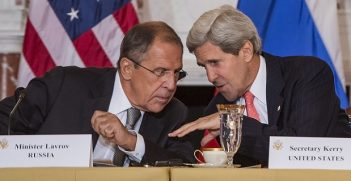Young People Drive New Approaches to International Engagement

Young people have tremendous potential to exert significant influence – both now and in the future. For Australia to maximise its influence abroad, the challenges and opportunities presented by new “baby boom” youth generations around the world must be addressed.
At the 1960 Democratic Convention, John F Kennedy famously said in his nomination acceptance speech,
“We stand today on the edge of a New Frontier—the frontier of unknown opportunities and perils, the frontier of unfilled hopes and unfilled threats… Beyond that frontier are uncharted areas of science and space, unsolved problems of peace and war, unconquered problems of ignorance and prejudice, unanswered questions of poverty and surplus…”
Kennedy regularly spoke in terms of generational transitions, insisting that a new generation had come of age to confront these challenges — the generation that we would today refer to as baby boomers in countries like the United States and Australia. Kennedy called on this baby boom generation to be “pioneers” on this new frontier, asking,
“Can we carry through in an age where we will witness not only new breakthroughs in weapons of destruction, but also a race for mastery of the sky and the rain, the ocean and the tides, the far side of space, and the inside of men’s minds? … All mankind waits upon our decision. A whole world waits to see what we shall do.”
While much of the domestic public discourse in developed countries today is now focused on the implications of this now aging population, internationally, another baby boom generation of pioneers is facing its own new frontiers.
The New “Baby Boomers”
New “baby boom” generations are beginning to come of age in parts of the world that are vital to Australia’s long term international interests. In the Pacific, half of the region’s population is aged under 23. In India, the median age is just over 28, and it is home to more than 300 million children under the age of 15. Nearly one million Indians reach working age every month. In Indonesia, just over 40 percent of the population is aged under 24 – nearly 110 million people. 60 percent of the world’s population aged between 15-35 currently live in ASEAN – that’s 213 million people. Africa is projected to represent a quarter of the world’s population by 2050, and currently, 70 percent of sub-Saharan Africa is under the age of 30. In the Middle East, two-thirds of the population is younger than 30. Once again, the world is waiting to see what the pioneers of this generation shall do.
The institutions and instruments of international politics and statecraft around the world are often the domains of more established and more senior people. There’s no doubt that traditional instruments of statecraft and their practitioners – economic, military, diplomatic – will remain fundamentally important in maximising Australia’s international interest. Unfortunately, the perspectives and experiences of young people are all too easily overlooked in these spheres. Given this, policymakers should think harder about the implications of these youth cohorts for Australia and the way it engages with the world.
How youth cohorts in places like the Pacific, Southeast Asia, the subcontinent, the Middle East, and Africa play out matters to Australia. On the upside, if these societies can generate sufficient employment opportunities to meet demand, these youth cohorts could create a demographic dividend of the kind seen in East Asia in recent decades, where a sustained improvement in the ratio of the working age people relative to children and the elderly powered national economic growth and lifted standards of living. Such a demographic dividend could significantly increase the economic power and strategic weight of nations and entire regions.
Alternatively, if employment opportunities are not able to keep pace with demand, the prospect of mass youth unemployment and the accompanying individual frustrations and thwarted ambitions have the potential to threaten societal and political stability, fuelling conflict, terrorism, and people movements. This kind of instability has the potential to spread across international borders.
Beyond the economic impacts, these youth cohorts have a significant potential to exert significant influence on their countries’ national governments to shape societies consistent with their emerging cultural norms and political values.
Understanding the cultural norms and political values of these youth cohorts will help us understand how these nations and regions will evolve over future years. The need for urgent and serious action on climate change is close to a universal value among young people, who are more concerned about climate change than any other generation. They’ve grown up with the devastating impacts of climate change: fires, floods, extreme temperatures. A strong national record on taking climate change seriously is the price of admission for being taken seriously by this generation.
Opportunities for Australia
At the most fundamental level, young people in these countries need education and jobs. Australia can offer both. Australia’s world-class education system can remain a powerful lever of national influence, but the nature of these youth cohorts will require educational institutions to adapt to fully realise this opportunity.
The scale of demand will require new models of educational delivery. The old model of tertiary students travelling to Australia to live and study will not be able to scale to meet the size of the potential demand. Australian higher education institutions will need to expand their education offerings through the establishment of in-country and third-country facilities. Crucially, to help meet the scale of the employment demands in these countries, Australia will also need a new focus on international delivery of vocational education.
Similarly, Australia’s migration system offers significant opportunities. Skilled migration, working holiday, and temporary labour migration schemes could help generate employment opportunities and lifelong goodwill towards Australia. The Pacific Australia Labour Mobility scheme is a crucial source of employment opportunities for young people in the Pacific, generating substantial remittance flows and lifelong cultural bonds.
Done right, education and migration could be enormous generators of goodwill for Australia in these regions. Australia should be actively seeking to cultivate these incoming people-to-people connections. At the same time, it should further expand the outgoing people-to-people connections of young Australians with their peers overseas. If these youth cohorts are an opportunity for Australia, the perspectives and experiences of young Australians are the key for unlocking them.
Implications for Public Diplomacy
To be influential with these youth cohorts, policymakers and diplomats need to rethink tools of engagement. Young people are more digitally connected than any other generation. Indonesia now has TikTok’s second largest user base. Internet users in the Philippines spend the most amount of amount of time on social media across the Indo-Pacific, at 4 hours and 15 minutes a day. And there are half a billion active social media users in India.
Australia has the potential to be disproportionately influential on the social media platforms that connect young people, but the way Australia executes its public diplomacy with these audiences needs to continue to adapt. Once, diplomats communicated by cables – named after the physical international submarine communications cable the information travelled along. Now, in order to be influential, they must communicate foreign policy in totally new ways.
Increasingly, digital engagement and literacy is crucial to how Australia engages with Southeast Asia and the Indo-Pacific. Bringing younger Australians – born digital natives – into the foreign policy discussion is increasingly important in how Australia reaches out to and engages with the region, and the world. With that in mind, the Department of Foreign Affairs and Trade is looking ahead to the future, aiming to make sure Australia has all the right skills and capabilities it needs to support its international engagement. Rethinking approaches to strategic communications, and how messages are projected to bourgeoning younger generations, is an important challenge as we look to the decade ahead.
The Albanese government has set out an ambitious foreign policy agenda that it is pursuing with new energy and resources. Fostering engagement among Australian and overseas youth will be critical to its success.
Tim Watts is the Federal Member for Gellibrand and Assistant Minister for Foreign Affairs.
This article is published under a Creative Commons Licence and may be republished with attribution.





